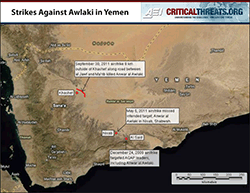 |
Al Qaeda-linked militants continued fighting Yemeni government troops in south Yemen where the militants control territory. Al Qaeda in the Arabian Peninsula’s principal bomb-maker may have been killed in the targeted strike that killed Anwar al Awlaki and Samir Khan in north Yemen.
A U.S. drone strike killed at least four al Qaeda operatives in al Jawf in north Yemen. American officials have confirmed that the U.S.-born radical cleric Anwar al Awlaki and Samir Khan, also an American, were killed in the strike along with at least two other operatives. Awlaki and Khan spearheaded al Qaeda in the Arabian Peninsula’s English-language outreach through their e-magazine, Inspire. AQAP’s chief bomb-maker Ibrahim Hassan al Asiri may also be among those killed, according to U.S. intelligence officials. Yemen security officials denied that Asiri was among the dead.
Fighting between Yemeni troops and al Qaeda-linked militants continues in south Yemen. A Yemeni military official reported that the army had killed twenty militants near Zinjibar. Six soldiers also died in the fighting. Five of them were killed in Bajdar district Saturday and one soldier was killed in Kod south of Zinjibar Friday.
Al Qaeda in the Arabian Peninsula (AQAP) released a statement claiming responsibility for Yemeni troops’ deaths in south Yemen. AQAP reported that it killed 130 members of Yemen’s Central Security Force on September 14 when it attacked a garrison in Zinjibar. The statement also claimed the attack on the Political Security Office building, intelligence service building and public security building in Aden on September 12. AQAP also claimed that it killed two soldiers from the 25th mechanized brigade on September 11 and that ten soldiers were killed in an ambush outside of Zinjibar.
Yemeni President Ali Abdullah Saleh set a condition for his stepping down from power. Saleh told reporters that he would not agree to a transition of power as long as key rivals, including defected General Ali Mohsen al Ahmar and the al Ahmar family, remained in power.
The ongoing political crisis in the capital has placed the Yemeni state at risk of a broader armed conflict. Further, the Yemeni state has been undergoing fragmentation. Al Qaeda has seized control of territory in south Yemen and the current situation has increased the organization’s operating space in the country.
